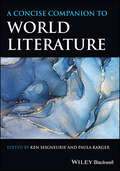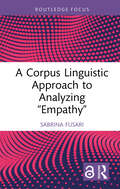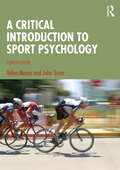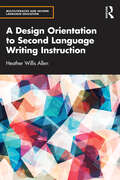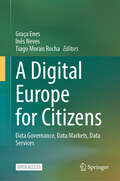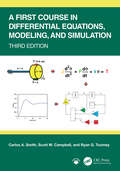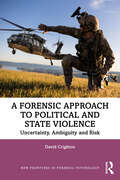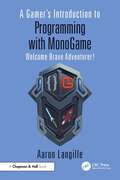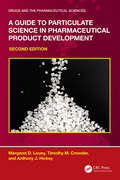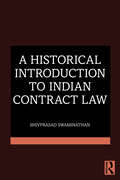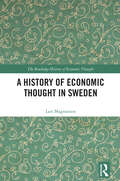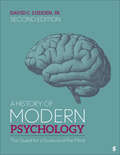- Table View
- List View
A Compassionate Calling: What It Really Means to Be a Veterinarian
by Marie HolowaychukA Compassionate Calling offers an unflinching and deeply personal look into the realities of the veterinary profession.Dr. Marie Holowaychuk, a veterinary specialist with experience in academia, emergency and referral hospitals, and general practice, weaves candid personal stories with evidence-based insights from published research. In 40 concise and thought-provoking chapters, she explores the hidden curriculum of veterinary school, the toll of on-call work, the emotional impact of euthanasia, the challenges of practicing during a pandemic, and many other important topics. Marie also tackles pressing issues like diversity, equity, inclusion, and the evolving dynamics of pet insurance and corporatization in veterinary medicine.Despite nearly 90% of pet owners viewing their animals as family members, few truly understand the challenges veterinarians face daily. This book pulls back the curtain to address questions such as: Why don’t some veterinarians recommend the profession to others? How do distressing events, like euthanasia and moral stress, affect veterinarians’ mental health? What do veterinarians wish pet owners knew about the emotional and mental toll of caring for their animals? With its blend of heartfelt storytelling and practical insights, A Compassionate Calling is essential reading for pet owners, aspiring veterinarians, and anyone curious about the veterinary profession. Practicing veterinarians will also find comfort and connection in its honest exploration of the joys and struggles of veterinary life.
A Concise Companion to World Literature
by Ken Seigneurie Paula KargerProvides a student-friendly introduction to World Literature Bridging the gap between introductory materials and advanced scholarly research, the Concise Companion to World Literature offers a streamlined selection of the most popular and essential essays from The Companion to World Literature, specifically tailored for undergraduate students and instructors. This single-volume resource, edited by Ken Seigneurie and Paula Karger, presents 100 carefully curated chapters, fully revised for clarity and accompanied by newly commissioned essays. The Concise Companion, which retains the original work's three-tiered organizational structure—period essays, thematic bridge essays, and author-title chapters—offers a nuanced exploration of major literary traditions across time and geography. Each entry contextualizes major literary works within the broader framework of global literary traditions, enriching discussions on periodization, literary movements, and cross-cultural connections. With its accessible scholarship and enhanced learning tools, it is a vital resource for students beginning their journey in World Literature and for educators seeking a structured, easy-to-use reference. Providing an engaging approach to the vast landscape of global literary traditions, the Concise Companion to World Literature: Features an entirely new introductory section that offers contemporary perspectives on World Literature Showcases a diverse array of global texts, authors, and traditions to deliver a broad and inclusive literary perspective Addresses key debates in World Literature, including periodization, cross-cultural exchange, and literary historiography Includes a new pedagogical supplement to assist instructors in course design and aid students in literary analysis The Concise Companion to World Literature, designed for second- and third-year undergraduate students, is an essential resource for courses in World Literature, Comparative Literature, and Humanities programs. It is also a valuable tool for graduate students and faculty seeking an authoritative and easy-to-use reference for teaching and research in the field.
A Contemporary History of Marx’s Capital: The Inexhaustible and the Unfinished (Marx and Marxisms)
by Paolo FavilliPaolo Favilli provides both students and scholars with an original reading of themes and issues found in Karl Marx’s Das Kapital and its connections with present- day challenges. By way of continuous cross- referencing between present and past, Favilli demonstrates that claims regarding the scientific status of Das Kapital, advanced by countless texts since its original publication, are themselves deeply imbued by the ‘spirit of the times’. If in 1963 Jean-Paul Sartre could write that Marxism was the unsurpassable philosophical horizon of our times, what could make an undergraduate student today consider such a claim plausible?Informed by the latest research on Marxist theory and decades of teaching the Philosophy of History, Favilli employs a didactic approach stimulating student engagement and learning opportunities in the classroom. This approach allows for a better understanding of relationship between the present and the multiple temporalities that characterise and periodise the contemporary era. What follows is a critique of the contemporary academy for its hangover of post-1989 nuovismo (cult of novelty) and inability to make the proper distinctions between Marxism-as-party-state, the works of Karl Marx, and Marxism as an object of history. This led to the spectacle where after 1989, those who had spent most of their careers as Marxist-hued scholars not only abandoned this identity but also spurned any recognition that Marx and Marxism were worthwhile objects of enquiry.This book was first published in Italian as A proposito de ‘Il capitale’..., Il lungo presente e i miei studenti. Corso di storia contemporanea (Milan: FrancoAngeli, 2021). This English translation includes a new foreword by the author.
A Corpus Linguistic Approach to Analyzing "Empathy" (Routledge Focus on Applied Linguistics)
by Sabrina FusariThis volume offers an in-depth corpus linguistic analysis of the word “empathy” aiming to foster unique insights into a word widely found across contemporary discourses and into methodological innovations for analyzing large corpora. Given the understanding of empathy’s importance for individual and social development, A Corpus Linguistic Approach to Analyzing “Empathy” demonstrates the potential of a corpus approach to shed new light on a significant yet difficult-to-define concept. Fusari systematically applies the use of concordances and other corpus output to derive patterns and recurrent phraseologies in the 36+ billion-word electronic corpus, English Web 2020, to help readers grapple with key ideas around empathy. Such questions include what we really mean by empathy, whether it is always positive, whether it is learned or innate, and whether empathy is truly what “makes us human”. The book contends with these questions across disciplines, from the clinical to the psychological and philosophical to the linguistic and discursive. Opening new areas of research into inclusive language and the use of corpus tools to analyze individual terms, this book will be of interest to students and scholars in corpus linguistics and applied linguistics, as well as such fields as cognitive science, psychology, philosophy, and allied health.
A Corpus-based Analysis of Vocabulary Translation in Teaching Chinese as a Foreign Language (Routledge Studies in Chinese Translation)
by Saihong Li Yifei HaoThis monograph investigates the landscape of vocabulary translation challenges within Teaching Chinese as a Foreign Language (T.C.F.L.) textbooks. In the era of globalisation, where the demand for Chinese language proficiency has escalated due to cultural exchanges, economic collaborations, tourism, and overseas learning, this study examines the accuracy and effectiveness of vocabulary translations in T.C.F.L. textbooks. The authors adopt an innovative approach, centring on analysing audience responses, including feedback from teaching practitioners and learners of Chinese languages and utilising corpus-based data to evaluate the consistency and appropriateness of vocabulary translations. This book is an essential resource for scholars and educators, as well as students in education, Chinese studies, translation studies, and language learning.
A Critical Introduction to Sport Psychology
by Aidan Moran John TonerThis new fourth edition remains the only textbook in the field which provides a detailed overview of key theories, concepts and findings within the discipline of sport psychology, as well as a critical perspective that examines and challenges these core foundations.Fully revised and updated, the new edition covers topics affecting both participation and performance in sport, including motivation, anxiety, emotional coping, concentration, mental imagery, expertise, and team cohesion. In addition, the book includes a range of helpful features that bring the science to life, including critical thinking exercises, suggestions for student projects, boxes highlighting key advances in theory or practice, and end-of-chapter summaries. The final chapter examines some new horizons in sport psychology, including embodied cognition, and a comprehensive glossary is also included.Sport is played with the body but often won in the mind; that is the theory. A Critical Introduction to Sport Psychology is the definitive textbook for anyone wishing to engage critically with this fascinating idea.
A Design Orientation to Second Language Writing Instruction (Multiliteracies and Second Language Education)
by Heather Willis AllenA Design Orientation to Second Language Writing Instruction presents the principles of a Design orientation to second language writing and argues for new directions in second language writing instruction.This book elaborates an approach to L2 writing instruction relevant for the diverse multilingual educational contexts and ever-changing literacies of the 21st century. A comprehensive introductory chapter which synthesizes recent history and current challenges in writing instruction for languages other than English is followed by chapters that link theory and practice, articulate principles of Design writing, and provide practical guidance for how instructors can implement Design writing instruction in ways that increase the relevance and value of writing for today's diverse learners.As well as being a valuable resource for researchers of second language acquisition and second language instructors at all levels of instruction, A Design Orientation to Second Language Writing Instruction will also appeal to teacher educators and graduate students.
A Developmentalist's Guide to Better Mental Health: Navigating Everyday Life Dilemmas
by Lois HolzmanA Developmentalist’s Guide to Better Mental Health offers mental health professionals a practical, philosophical, and playful guide for working relationally and developmentally with dilemmas, muddles, and the emotions that accompany them.The book centers around dozens of letters from writers asking “the developmentalist” for help with a wide range of issues. Organized by topics and themes—including trauma, family and relationship issues, living with uncertainty, workplace problems, and more—the letters and the developmentalist's thoughtful, thought-provoking responses lay out a wide variety of strategies for inviting clients into developmental journeys. When shared with clients, the letters and responses are a rich resource for therapeutic conversations. The book includes theoretical and conceptual background information as well as commentary from mental health professionals who already use the letters and responses in their practices.A Developmentalist’s Guide to Better Mental Health is unlike other practical guides in both its format and in its focus on development, especially emotional and social development, as a creative activity.
A Digital Europe for Citizens: Data Governance, Data Markets, Data Services
by Graça Enes Inês Neves Tiago Morais RochaThis "open access" book presents the Proceedings of the First International Conference &“A Digital Europe for Citizens&”, which was organised by the Jean Monnet Module DigEUCit, &“A Digital Europe for Citizens. Constitutional and Policymaking Challenges&” and the CIJ (Centre for Interdisciplinary Research on Justice, Faculty of Law, University of Porto). It focuses on three main topics – data governance, digital markets, and digital services – and brings together chapters written by legal experts who address the EU&’s accomplishments and future perspectives on the ongoing Digital Revolution, as well as the impact of digitalisation on the EU. Comparisons with other legal systems are also included. Adopting a holistic perspective with a focus on citizens, the book contends that constitutionalism must also be viewed in its role of ensuring democracy, an open and inclusive society, and a fair economy. It pursues an original, cross-sectoral and cutting-edge approach. In addition to discussing fundamental values and principles, the contributing authors address concrete and practical questions that arise from the EU&’s policy and legal framework. The aim is to bring constitutionalism to the digital stage and to advance solutions and a proper framework, building on solid foundations.This comprehensive work will be of interest to legal scholars, academics, researchers and practitioners in the areas of European and constitutional law, data protection, competition and consumer law, as well as a larger audience of policymakers and digital entrepreneurs.
A Dream Deferred: Jesse Jackson and the Fight for Black Political Power
by Abby PhillipFrom CNN’s Abby Phillip, a triumphant new look at Jesse Jackson’s presidential campaigns of the 1980s and how they changed Black political power“A joyful, rich, must-read biography of a politician whose flaws and gifts were in constant, intense competition.” —Jake TapperJesse Jackson, the civil rights leader, activist, raconteur, and political candidate, finally gets a book worthy of his stature courtesy of CNN anchor Abby Phillip.Focusing on his presidential runs in 1984 and, especially, 1988, Phillip highlights how Jackson built an unlikely coalition that showed how Black political power could be consolidated. His experience working under Martin Luther King; his organizing the SLCC’s Operation Breadbasket in Chicago and beyond; and his roots in the deep South combined into two astonishingly impactful presidential campaigns. Appealing to the working people of urban enclaves like that of Chicago, young people on college campuses, and Black people across the South, he created the modern Democratic coalition—one that has been used by all major Democrats seeking national success from Obama to Biden to Harris.With her expert reporting, natural storytelling skills, and a story so full of humanity, politics, and hope, Abby Phillip has written a rousing popular history that sheds new light on an American icon.
A Feminist Counter-History of Latin American Documentary (Routledge Advances in Film Studies)
by Lorena Cervera FerrerA Feminist Counter-History of Latin American Documentary provides a new lens through which to revisit the history of Latin American cinema and proposes three approximations to the study of women’s documentary produced between the early 1970s and the mid-1990s.With a focus on documentaries with clear political intents, this book illustrates some of the thematic interests, authorial modes, production practices, formal devices, and aesthetic strategies employed by women filmmakers. Through analysis of the contexts, processes, and forms of a selection of films, the author shows how these non-fiction films shed light on the precarious conditions that characterised women’s greater entry into the workforce, on the circulation of feminist ideas, and on the inevitable questioning of identity that resulted from migration and displacement.This volume will appeal to scholars and students interested in women’s and feminist cinema, documentary history, theory, and practice, and Latin American history and culture.
A Field Manual of Magnetotelluric (MT) Surveys with Case Studies for Earth Scientists and Engineers
by O. P. Mishra D. C. NaskarThis book details both conventional and advanced geophysical techniques with description of the Electromagnetic (EM) based physics involved in different methodologies of magnetotellurics (MT). It offers detailed discussions of the theory of EM and MT methods, and the operation of specific instruments, including the presentation of results and their interpretation in tabular format. The chapters describe the conceptual background of MT geophysical methods along with the related instrumentation, sufficient illustrations, and the applicability of the individual methodologies supported by successful case histories.Features: Provides a comprehensive introduction to the MT–geophysical method. Covers diverse geotectonic settings with several case studies, supported by diagrams and data tables. Describes the fundamentals of uncontrollable telluric and controllable non-telluric sources used in MT surveys. Reviews MT methods with emphasis on recent improvements, recognizing both static and distortion effects and their treatment in the analysis of impedance tensors in 3-D inversion codes. Explores integrated MT interpretation coupled with seismic and potential (gravity, magnetic) geophysical methods. This book is aimed at professionals, students, and researchers in geophysics, geology, civil, mechanical, petroleum, and geothermal engineering, and other branches of earth and environmental sciences.
A First Course in Differential Equations, Modeling, and Simulation
by Carlos A. Smith Scott W. Campbell Ryan G. ToomeyA First Course in Differential Equations, Modeling, and Simulation shows how differential equations arise from applying basic physical principles and experimental observations to engineering systems. Avoiding overly theoretical explanations, the textbook also discusses classical and Laplace transform methods for obtaining the analytical solution of differential equations. In addition, the authors explain how to solve sets of differential equations where analytical solutions cannot easily be obtained. Incorporating valuable suggestions from mathematicians and mathematics professors, the third edition: Reworks the chapter “Response of First and Second Order Systems” to include the system response to step changes, impulses, rectangular pulses, and sinusoid forcing functions as well as the response of coupled first- and second-order ordinary differential equations (ODEs); it also introduces Bode plots to analyze the frequency response of second-order ODEs and the principle of oscillation modes in coupled second-order ODEs Adds a new section on springs and dampers in series or parallel Includes new content on Simulink® and modeling Contains new exercises that can be used as projects and answers to many of the end-ofchapter problems Features new end-of-chapter problems and updates throughout This textbook provides students with a practical understanding of how to apply differential equations in modern engineering and science.A solutions manual and files of all figures in the text are available to adopting professors.
A Forensic Approach to Political and State Violence: Uncertainty, Ambiguity and Risk (New Frontiers in Forensic Psychology)
by David CrightonA Forensic Approach to Political and State Violence applies a forensic lens to the study of risk in relation to political and state violence.Divided into three parts, the book outlines the nature and function of political and state violence and the historic development of contributions from forensic practice. It then considers the distinction between political and state violence and the foundations for this. This is followed by a review of developments of current research and practice looking at future development and the ways in which forensic practice might more effectively contribute to risk reduction and management. The text will argue that the basis of much current forensic practice, in relation to political and state violence, is unduly limited and has failed to integrate relevant scientific research into practice. The role of market-led approaches to work in these areas will also be considered, in relation to the way this has influenced and distorted practice and delayed progress. Drawing on theories derived from psychology and other areas of research, the book considers how evidence might inform improvements, using the risks and uncertainties that surround politically motivated violence to illustrate this. Real cases of political and state violence are considered, with topics including military conflict, terrorism, use of torture and hostage taking to highlight current failings and weaknesses. Barriers to implementing better forensic practice in terms of both professional, economic and policy interests are also explored.It will be an essential read for all students or practitioners in the areas of forensic psychology, criminal justice or violence risk management.
A Gamer's Introduction to Programming with MonoGame: Welcome Brave Adventurer!
by Aaron LangilleA Gamer’s Introduction to Programming with MonoGame: Welcome Brave Adventurer! is a great way to combine your current love of both video games and coding into a brand‑new love of writing your own games. In this book, you’ll learn the essential ins‑and‑outs of how to work with fonts and text, images and sprites, audio, and even animation. You’ll learn how to give your players control over their destiny through keyboards, mice, and gamepads, and you’ll harness the never‑ending energy of the gameplay loop functions. But coding books are technical, boring, and scary, aren’t they? Not this one. Within these pages, you’ll find a fun and approachable adventure that will introduce you to the accessible but powerful MonoGame development framework. Using Visual Studio and C#, you’ll write simple but engaging interactive scenes and games that will gradually build up your coding skills and confidence. Packed with practical examples, plain‑language explanations, images, and illustrations, this book is structured like a video game, complete with levels to progress through, cutscenes to give you extra information, and final challenge projects to show you how everything fits together and to help build your own creative portfolio. It is also the second book in an ongoing series designed to take you from zero experience to writing your own video games and interactive digital experiences using industry standard languages and tools. For readers with previous object‑oriented programming experience, this book is a standalone introductory MonoGame adventure. Gain even more experience by exploring the resources, bonus materials, and extensive code samples available at the companion website: https://welcomebraveadventurer.ca. Now, gather your courage and prepare to level up by joining the MonoGame coding quests that await you inside.
A Global Financial History of Oil Crises (Routledge Explorations in Economic History)
by Carlo Edoardo AltamuraIn this book, Altamura analyses the oil shocks of 1973 and 1979, considering their impact on the world economy and subsequent reactions to the global instability.In terms of actors, the focus is on how international organisations such as the IMF, World Bank and OECD responded to the crisis, as well as the behaviour of commercial banks and central banks and of countries in the Global South. Altamura draws on newly available archival material from private financial institutions to paint a full picture of a rapidly changing world which paved the way for stagflation and interdependency.This monograph will be illuminating reading for economic and financial historians, plus scholars looking at energy history, the Cold War in a global context, the New International Economic Order and the political economy of the 1970s.
A Guide to Particulate Science in Pharmaceutical Product Development (Drugs and the Pharmaceutical Sciences)
by Anthony J. Hickey Margaret D. Louey Timothy M. CrowderThe pharmaceutical applications of powder technology have long been recognized. Yet while many books focus on aspects of powder formation and behavior, there are few texts that explore the power of particulate science in the design, manufacture, and control of quality medicines. This revision discusses key principles and practical applications. The authors cover particulate material, its form and production, sampling from bodies of powder, particle size descriptors and statistics, behavior of particles and powder, instrumental analysis, particle size measurement and synergy of adopted techniques, and in vitro and in vivo performance criteria. Case studies are included in this new edition.This fully revised edition: Provides an essential account of particulate science including several new chapters on multicomponent particles, regulatory considerations and product development Presents a variety of topics ranging from the quality of published data on particle size in pharmaceuticals to the future of crystal engineering Reviews methods of particle measurement and their importance for specific applications Discusses misconceptions and misunderstandings of particulate science together with lessons from other industries
A Historical Introduction to Indian Contract Law
by Shivprasad SwaminathanThis book offers a genealogy of the core concepts of Indian contract law, tracing their trajectory from the nineteenth century soil of English jurisprudence in which they germinated, to their transplantation into the Indian Contract Act 1872, and the interpretation of the provisions containing these concepts by Indian courts and influential treatise-writers, over the last one hundred and fifty years.The concepts studied by the book are: i) formation; ii) consideration; iii) privity; iv) capacity; v) consent; vi) frustration; vii) damages viii) stipulated sums; and ix) unjustified enrichment. With respect to each of these concepts, the book seeks to provide an account of the state of the English law at the eve of the drafting of the Act, with a particular emphasis on the impact the civil law had on the concept and a close study of the legislative history of the provisions of the Act codifying the concept, with a view to uncovering what the drafters had originally envisaged.Based on extensive doctrinal and archival research, the book offers:• a historical background to the drafting of the Indian Contract Act and the codification process.• a jurisprudential exploration of the limitations of common law codification gleaned from the working of the Act.• the draft of the contract code accompanying the report of the Indian Law Commissioners in 1866, which is essential to understand the intention of the drafters of the Act.• historical insights which hold the key to illuminating contemporary contract law problems of the kind courts routinely grapple with.
A Historicized Ontology for the Quantum World: A Philosophical Investigation of the Quantum Histories Interpretation
by Kefu ZhuThis book discusses the ontology in the quantum world and argues that it should be interpreted as a historicized ontology. This perspective is advocated by the quantum histories interpretation.Inspired by the nomological interpretation from Bohmian mechanics and the corresponding understanding of the law of nature and logic, the ontology will be useful to solve the difficulties of confusing ontology and perplexing logical inference. Furthermore, this book proposes that the historicized ontology can be generalized to more complicated structures and fit naturally into temporal correlation. Core philosophical issues such as the law of nature, the ontology of events, history, and processes, and the metaphysics of history are coherently discussed, revealing the profound meaning behind the formalism of quantum histories. By providing a new framework for a historicized picture of ontology, it will effectively promote the debates in the philosophy of physics and the fundamental research in quantum mechanics.This book will appeal to scholars and students of the philosophy of science, metaphysics, and quantum theory.
A History of Economic Thought in Sweden (The Routledge History of Economic Thought)
by Lars MagnussonSituating key texts and writers in their proper historical context, this book presents a history of Swedish economic thinking from early modern times to the present day.Highlighting key elements of Swedish political, economic and social history allows the book to shed new light on important parts of the story including the development of neo-classical economics from the late 19th century - associated with leading names such as Knut Wicksell, Gustav Cassel and Eli Heckscher – and the rise of the so-called Stockholm school in the 1920´s and 30´s. But the book also goes back further to explore the Swedish economic literature of the 18th century, particularly its more “liberal” version of mercantilism and cameralism, as well as early modern and medieval developments. Throughout, the book emphasizes the unique nature of much of the economic thinking emanating from Sweden. Emulation and adaption of political economic thinking imported from abroad – primarily the UK, France and German speaking countries - is an important part of this story, but this is shown to be an active process which has resulted in great originality in Swedish economic thought.This book will be of interest to readers in the history of economic thought, economic history, the history of ideas and Swedish history.
A History of Energy in Mexico: From Cornfields to Solar Farms
by Philip L. RussellThis volume synthesizes energy history in Mexico from pre-Conquest times to the present. It traces human development from a low-energy, sustainable existence to fossil fuel-based non-sustainability.The book familiarizes readers with different energy sources, what the advantages and disadvantages of each source are, and how the importance of each energy source has changed over time. From early agricultural beginnings and Spanish-introduced energy innovations to the rise of coal and oil, the volume analyzes how evolving energy sources produced sweeping environmental and social change. It also studies economic history from the approach of the emerging field of biophysical economics, recognizing the often-overlooked role of energy in Mexico’s development. Linking this development to climate change, the book discusses the ways in which Mexico and the Global South are impacted by this crisis, despite doing little to cause climate change themselves. Later chapters inform readers of how energy issues have shaped U.S.–Mexican relations throughout the twentieth century and into today.A History of Energy in Mexico will be of value to students of environmental, economic, and Mexican history as well as political scientists, economists, and anthropologists.
A History of Intimacy Professionals in Entertainment: An Inside Look at a Movement
by Brooke M. HaneyA History of Intimacy Professionals in Entertainment is the first book that explores the evolution of intimacy coordinators, choreographers and directors in the performing arts, highlighting the history of their critical role in fostering safe(r) and respectful environments on set and in theaters.Readers will gain a deep understanding of the history and importance of intimacy work in the entertainment industry, as told by an insider, along with insights into the creation of best practices and protocols and the emergence of training organizations. Focused primarily on the USA, part one dives into the cultural events that impacted and galvanized the role of intimacy professionals, like TIME'S UP, #MeToo, Black Lives Matter and the Covid-19 pandemic. It also looks at how unions and the press responded to and affected the movement, as well as other communities that influenced the creation of protocols. Part two consists of interviews with global thought leaders, analysis and resources. A love letter to the intimacy industry, A History of Intimacy Professionals in Entertainment is meant for producers, directors, actors, educators, students in performing arts programs and anyone who advocates for safer practices in entertainment. Intimacy professionals will also greatly benefit from having the knowledge of how we got here recorded.
A History of Modern Germany: 1871 to Present
by Dietrich OrlowNow in its ninth edition, A History of Modern Germany provides the most up-to-date and comprehensive survey of this complex country’s history, beginning in 1871 and ending in the present day.Orlow tells the story of Germany’s troubled past—Prusso-German authoritarianism, the Nazi dictatorship, and the Holocaust—whilst also uncovering the long-standing traditions of political, cultural, and economic pluralism that have existed alongside. Over the years, historians have debated the cause of Germany’s volatile and unpredictable trajectory; this textbook offers readers insight into this lively historiography. While taking Germany as its focus, this book also covers its interaction with the rest of the world, including the two world wars and Germany’s brief colonial experience. This ninth edition is the only textbook that brings the story to the present day; its new chapter on the years 2017-2024 delves into Germany’s role in the global balance of power.With Im Mittelpunkt (‘In the Spotlight’) features on key figures and an expanded list of ‘Suggestions for Further Reading’, this new edition remains the perfect grounding for all students of German history.
A History of Modern Psychology: The Quest for a Science of the Mind
by David LuddenA History of Modern Psychology: The Quest for a Science of the Mind describes the evolution of psychology into the twenty-first century with coverage of recent events and findings that transform our understanding of the past. With a topical approach that presents key thinkers within the context of schools of thought, students are able to see how philosophers, researchers, and academics influenced one another to create the rich and diverse landscape of modern psychology in a global context. In the new Second Edition, the author expands coverage of unsung pioneers (philosopher Al-Balkhi, zoologist Charles Henry Turner, psychiatrist Grunya Sukhareva, and others), revisits the legacy of Francis Galton, explores the "Vygotsky boom," and includes new discussion of the impact of Philip Zimbardo′s Stanford Prison Experiment. Through detailed timelines and features such as "Looking Back" and "Looking Ahead," Ludden gives students a deeper appreciation for the transference of knowledge that shaped the field.
A History of Modern Psychology: The Quest for a Science of the Mind
by David LuddenA History of Modern Psychology: The Quest for a Science of the Mind describes the evolution of psychology into the twenty-first century with coverage of recent events and findings that transform our understanding of the past. With a topical approach that presents key thinkers within the context of schools of thought, students are able to see how philosophers, researchers, and academics influenced one another to create the rich and diverse landscape of modern psychology in a global context. In the new Second Edition, the author expands coverage of unsung pioneers (philosopher Al-Balkhi, zoologist Charles Henry Turner, psychiatrist Grunya Sukhareva, and others), revisits the legacy of Francis Galton, explores the "Vygotsky boom," and includes new discussion of the impact of Philip Zimbardo′s Stanford Prison Experiment. Through detailed timelines and features such as "Looking Back" and "Looking Ahead," Ludden gives students a deeper appreciation for the transference of knowledge that shaped the field.

